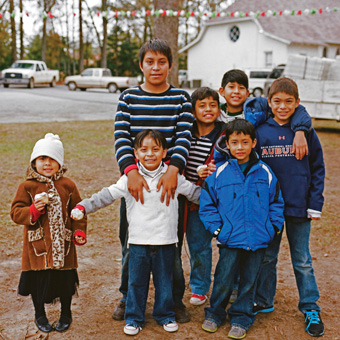In the wake of a harsh new immigration law, the popular devotions of a small Alabama parish mirror the new fears and hardships of its members.
Last December’s Posadas and Our Lady of Guadalupe celebrations were different at St. Mary’s Church in Opelika, Alabama. Over the past 11 years the small Catholic parish in east central Alabama has seen a steady growth in the attendance at its Spanish Masses, and for several years now the feast of Our Lady of Guadalupe (December 12) and the Posadas (the nine-day pre-Christmas processions during which the search for shelter by Joseph and the pregnant Mary is reenacted) have been annual highlights that its many Latino parishioners look forward to.
But two and a half months after Alabama’s harsh new immigration law—known as HB 56—took effect, the parish decided it had to take some new precautionary steps before the most recent celebrations.
Vincentian Father Jack Kane, the pastor, says the parish decided to keep the procession that follows its outdoor Mass for the feast of Our Lady of Guadalupe shorter than in previous years. Mindful that HB 56 requires police to follow up on any “reasonable suspicion” and determine a person’s legal status—a provision that encourages racial profiling of Latinos—Kane says, “We didn’t want to do anything big, so as not to call attention.”
The Posadas involve different families hosting the celebrations on the nine nights before Christmas. “This year we did not want to have big celebrations with overflowing crowds that could not fit into a trailer,” Kane says. “A neighbor, not understanding Spanish or knowing what it was all about, might call the police about a ‘disturbance’ in the trailer camp. Parishioners that lived in an area that might be more English-speaking would sponsor the gathering that night, but they would bring the food to the parish hall. That’s the first time we’ve ever done that.”
As parishioners held their Posadas, it brought home how the increasingly inhospitable and hostile treatment many of them experience today mirrors the “no room at the inn” treatment Mary and Joseph received in Bethlehem.
The traditional Posadas song, which is sung as the parishioners process from house to house asking for lodging, includes the plea from the pilgrims to the shelter-refusing “innkeeper”: “Do not be cruel. Have mercy on us, for God in the heavens will come to reward you.”
The sung response from inside the “inn” seems like an eerie precursor of HB 56 and the anti-immigrant sentiments Latinos encounter today: “You can just leave now and bother me no more. For if I get angry, I will come out and strike you.”
Abel Carrias, a leader in the parish’s Hispanic ministry committee, says, “This year several immigrants commented on how much they personally identified with the Posadas and how they related it to the difficulties they face because of the immigration law. One of the members mentioned that during this time he finds solace in the birth of our Savior, who is always there to comfort everyone, regardless of nationality.”
According to Kane, who also serves as the vicar for Hispanic ministry in the Archdiocese of Mobile, Alabama, the controversial new law has instilled widespread fear among the state’s Hispanic population. Along with thousands of other Latinos, several St. Mary’s families have left the state “out of fear,” says Kane, “because of the school regulations and fear that they could be deported and would have to leave their children behind. So they took themselves out of that situation.”
The requirement that public schools determine students’ and parents’ legal status was among the most extreme provisions of HB 56. Last fall it was temporarily blocked, along with other provisions such as a broad one against knowingly “concealing, harboring, or shielding” an undocumented immigrant. Mobile Archbishop Thomas Rodi had condemned that part of the law, saying it would “make illegal the exercise of our Christian religion.”
Kane can’t help but comment on what he calls the “stupidity of the law,” with some parts of the law being so absurd, he says, that in December even Alabama Gov. Robert Bentley had to acknowledge that it would need to be changed.
The fact that the state’s economy is now feeling the impact of the law has led political leaders to reassess what they have wrought. “In northern Alabama the tomato crop went to waste,” says Kane, “and I’ve heard they are now importing tomatoes to the region from Tennessee.”
The majority of St. Mary’s Latino parishioners work in construction and landscaping. Some estimate that one in four construction workers has left Alabama, severely hampering the reconstruction after last year’s devastating tornadoes.
More recently the situation has somewhat quieted down, according to Kane, and police chiefs have stated they don’t have the resources to enforce the law. Kane says that, although the general expectation now is that the law will be reassessed, “No one knows what it is going to be changed to, and so some fear remains.”
He adds, “The other day I invited a young man I know very well to a Cursillo retreat in March. His response was, ‘It depends if I’m still here.’ Their whole life is up in the air. It must be very hard to live that way.”
Carrias says that after the first group of parish families left right after the new immigration law took effect, others who initially were terrified “are still thinking of leaving but at the moment have adopted a wait-and-see approach. . . . Life has definitely changed for immigrants around here,” Carrias reports. “For example, people have told me they are avoiding leaving their homes unless they have to, or they make one single trip to do laundry, buy groceries, and cash their checks. People are avoiding driving at night. Many no longer take their kids out to the movies, sports activities, or restaurants.”
Kane has focused his ministry in the parish on providing a welcoming home for the area’s Latino population, while also trying to bring the English- and Spanish-speaking parish communities together. “One of the things the Hispanic population really needed was a sense that this was their parish, because nothing else would give them that,” he says. St. Mary’s is the only Catholic church in the area that offers Mass in Spanish every Sunday, and parishioners travel to the parish from far away.
“Not only does the church fulfill the spiritual needs of the Hispanics,” Carrias explains, “it also provides a platform for people to get to know others, to find support, and to share information.” The parish’s Hispanic ministry includes not only liturgy and sacramental preparation, religious education, Cursillos, retreats, and Bible classes, but also question-and-answer sessions with immigration lawyers, an annual health fair, English classes, and assistance with translating and filling out forms.
“We would like to provide a lot more services,” says Carrias, “but our church is small, and it has been a bit challenging to get funding to provide additional support for those in need.”
This article appeared in the March 2012 issue of U.S. Catholic (Vol. 77, No. 3, pages 18-21).
Image: Wes Frazer














Add comment